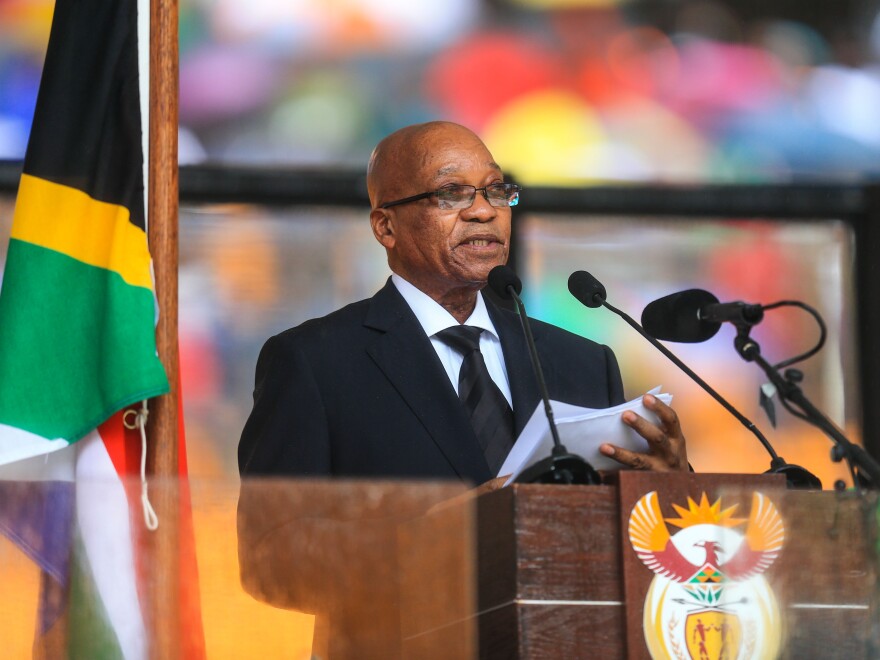South African President Jacob Zuma likes to see himself as following in the footsteps of Nelson Mandela: They made their names in the anti-apartheid movement, they were imprisoned together on Robben Island and they both were elected president.
But that's where the comparison ends.
Zuma, who has been embroiled in multiple corruption and sex scandals, thought he might catch a break and bask in Mandela's reflected glory as the world pays tribute to the iconic figure following his death last week.
But from the moment that Zuma stepped into the stadium, he was booed repeatedly on Tuesday at a memorial service for Mandela. The event attracted tens of thousands to the country's largest soccer stadium in Soweto, the huge black township just outside Johannesburg.
'Embarrassing Spectacle'
This was no small achievement on Zuma's part. Most in the crowd were supporters or members of the African National Congress, the party of Zuma and Mandela. Despite sheets of rain, the audience was in a joyous, spirited, celebratory mood.
A long list of world leaders received rousing greetings, President Obama most of all. Zimbabwe's Rogert Mugabe is not welcome in many countries, but he was cheered. When the announcer noted the presence of F.W. de Klerk, the country's last apartheid-era leader and the man who released Mandela from prison, the crowd respectfully applauded.
Yet Zuma was jeered by parts of the crowd nearly every time his name was mentioned or his picture appeared on the stadium's jumbo screens. It got so bad at one point that organizers removed his likeness from the screen, replaced it with one of Mandela, and then played music in hopes of drowning out the catcalls.
Zuma's role in a memorial that lasted for several hours was limited to a short, bland speech near the end. Yet he managed to do something no one else has been able to do for the last several days — draw attention away from Mandela.
Zuma instantly became the main topic on television newscasts and talk radio programs. And the newspapers were harsh. The Star of Johannesburg ran a large, screaming headline on Wednesday morning: "Zuma's Humiliation."
"What was supposed to be President Jacob Zuma's moment of glory in the presence of world leaders like U.S. President Barack Obama, turned into a humiliating and embarrassing spectacle," the paper wrote.
Long List Of Controversies, Scandal
It's small consolation for Zuma, but the persistent booing was an illustration of the country's vibrant democracy, for which Mandela fought so hard.
The list of Zuma controversies is long. The most pressing one involves reports that the government paid $20 million to upgrade his private residence in a rural area outside the southeastern port city of Durban. Zuma's office has defended the work as necessary for improved security, but a government watchdog is trying to determine how a swimming pool, an outdoor amphitheater and other amenities might make the president safer. Opposition politicians were calling for his impeachment in the days before Mandela's death.
This episode has struck a nerve among South Africans who were already upset with Zuma over the state of a struggling economy that is not creating enough jobs for millions of impoverished blacks.
Zuma became president in 2009 after surviving a number of high-profile scandals.
Back in 2005, then-president Thabo Mbeki ousted Zuma as deputy president over allegations of a corrupt arms deal. An investigation lasted years, but no charges were filed.
Shortly after he lost his government position in 2005, Zuma was charged with rape, a case that riveted the country for months. He claimed that the sex with the woman – who was not one of his multiple wives — was consensual and he was acquitted.
Zuma has been married six times, a figure that includes four current wives, two of whom he wed after becoming president. He has about 20 children, including 14 with his wives and several more with other women.
Polygamy is legal in South Africa, though rarely practiced these days, and Zuma has come under criticism for the government expense involved in supporting his wives.
An Uncertain Future
South Africa is about six months away from an election, and the ANC is again expected to win easily. However, political analysts say Zuma is no longer a lock to be the ANC's choice for president.
Mbeki, Zuma's predecessor, was essentially forced from the presidency in 2008 by the ANC, and a caretaker was installed for several months before Zuma came to power the following year.
"Nelson Mandela's departure becomes a stark reminder of how people are missing everything that was good (in him)," political analyst Somadoda Fikeni told The Star.
Copyright 2026 NPR







